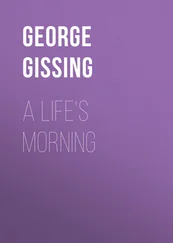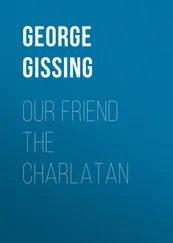George Gissing - Will Warburton
Здесь есть возможность читать онлайн «George Gissing - Will Warburton» — ознакомительный отрывок электронной книги совершенно бесплатно, а после прочтения отрывка купить полную версию. В некоторых случаях можно слушать аудио, скачать через торрент в формате fb2 и присутствует краткое содержание. Жанр: foreign_prose, literature_19, foreign_antique, на английском языке. Описание произведения, (предисловие) а так же отзывы посетителей доступны на портале библиотеки ЛибКат.
- Название:Will Warburton
- Автор:
- Жанр:
- Год:неизвестен
- ISBN:нет данных
- Рейтинг книги:4 / 5. Голосов: 1
-
Избранное:Добавить в избранное
- Отзывы:
-
Ваша оценка:
- 80
- 1
- 2
- 3
- 4
- 5
Will Warburton: краткое содержание, описание и аннотация
Предлагаем к чтению аннотацию, описание, краткое содержание или предисловие (зависит от того, что написал сам автор книги «Will Warburton»). Если вы не нашли необходимую информацию о книге — напишите в комментариях, мы постараемся отыскать её.
Will Warburton — читать онлайн ознакомительный отрывок
Ниже представлен текст книги, разбитый по страницам. Система сохранения места последней прочитанной страницы, позволяет с удобством читать онлайн бесплатно книгу «Will Warburton», без необходимости каждый раз заново искать на чём Вы остановились. Поставьте закладку, и сможете в любой момент перейти на страницу, на которой закончили чтение.
Интервал:
Закладка:
"Well, what's the matter? Don't you say thank you, nowadays?"
"Yes, sir—thank you, sir—it's all right, Mr. Will."
"I should think it is indeed. Be here to-morrow morning, to catch the 6.30 up train, Sam."
As Will entered the garden, there came forward a girl of something and twenty, rather short, square shouldered, firmly planted on her feet, but withal brisk of movement; her face was remarkable for nothing but a grave good-humour. She wore a broad-brimmed straw hat, and her gardening gloves showed how she was occupied. Something of shyness appeared in the mutual greeting of brother and sister.
"Of course, you got my letter this morning?" said Will.
"Yes."
"Mr. Turnbull is coming up to-night."
"I'm glad of that," said Jane thoughtfully, rubbing her gloves together to shake off moist earth.
"Of course he'll prophesy disaster, and plunge you both into the depths of discouragement. But I don't mind that. I feel so confident myself that I want some one to speak on the other side. He'll have to make inquiries, of course.—Where's mother?"
The question was answered by Mrs. Warburton herself, who at that moment came forth from the house; a tall, graceful woman, prematurely white-headed, and enfeebled by ill-health. Between her and Jane there was little resemblance of feature; Will, on the other hand, had inherited her oval face, arched brows and sensitive mouth. Emotion had touched her cheek with the faintest glow, but ordinarily it was pale as her hand. Nothing, however, of the invalid declared itself in her tone or language; the voice, soft and musical, might have been that of a young woman, and its vivacity was only less than that which marked the speech of her son.
"Come and look at the orange lilies," were her first words, after the greeting. "They've never been so fine."
"But notice Pompey first," said Jane. "He'll be offended in a minute."
A St. Bernard, who had already made such advances as his dignity permitted, stood close by Will, with eyes fixed upon him in grave and surprised reproach. The dog's name indicated a historical preference of Jane in her childhood; she had always championed Pompey against Caesar, following therein her brother's guidance.
"Hallo, old Magnus!" cried the visitor, cordially repairing his omission. "Come along with us and see the lilies."
It was only when all the sights of the little garden had been visited, Mrs. Warburton forgetting her weakness as she drew Will hither and thither, that the business for which they had met came under discussion. Discussion, indeed, it could hardly be called, for the mother and sister were quite content to listen whilst Will talked, and accept his view of things. Small as their income was, they never thought of themselves as poor; with one maid-servant and the occasional help of a gardener, they had all the comfort they wished for, and were able to bestow of their superfluity in vegetables and flowers upon less fortunate acquaintances. Until a year or two ago, Mrs. Warburton had led a life of ceaseless activity, indoors and out; such was the habit of her daughter, who enjoyed vigorous health, and cared little for sedentary pursuits and amusements. Their property, land and cottages hard by, had of late given them a good deal of trouble, and the proposal to sell had more than once been considered, but Mr. Turnbull, most cautious of counsellors, urged delay. Now, at length, the hoped-for opportunity of a good investment seemed to have presented itself; Will's sanguine report of what he had learnt from Sherwood was gladly accepted.
"It'll be a good thing for you as well," said Jane. "Yes, it comes just in time. Sherwood knew what he was doing; now and then I've thought he was risking too much, but he's a clear-headed fellow. The way he has kept things going so long in Ailie Street is really remarkable."
"I daresay you had your share in that, Will," said Mrs. Warburton.
"A very small one; my work has never been more than routine. I don't pretend to be a man of business. If it had depended upon me, the concern would have fallen to pieces years ago, like so many others. House after house has gone down; our turn must have come very soon. As it is, we shall clear out with credit, and start afresh gloriously. By the bye, don't get any but Applegarth's jams in future."
"That depends," said Jane laughing, "if we like them."
In their simple and wholesome way of living, the Warburtons of course dined at midday, and Will, who rarely ate without appetite, surpassed himself as trencherman; nowhere had food such a savour for him as under this roof. The homemade bread and home-grown vegetables he was never tired of praising; such fragrant and toothsome loaves, he loudly protested, were to be eaten nowhere else in England. He began to talk of his holiday abroad, when all at once his countenance fell, his lips closed; in the pleasure of being "at home," he had forgotten all about Norbert Franks, and very unwelcome were the thoughts which attached themselves to this recollection of his days at Trient.
"What's the matter?" asked Jane, noticing his change of look.
"Oh, nothing—a stupid affair. I wrote to you about the Pomfrets and their niece. I'm afraid that girl is an idiot. She used the opportunity of her absence, I find, to break with Franks. No excuse whatever; simply sent him about his business."
"Oh!" exclaimed both the ladies, who had been interested in the artist's love story, as narrated to them, rather badly, by Will on former occasions.
"Of course, I don't know much about it. But it looks bad. Perhaps it's the best thing that could have happened to Franks, for it may mean that he hasn't made money fast enough to please her."
"But you gave us quite another idea of Miss Elvan," said his mother.
"Yes, I daresay I did. Who knows? I don't pretend to understand such things."
A little before sunset came Mr. Turnbull, who took supper at The Haws, and was fetched away by his coachman at ten o'clock. With this old friend, who in Will's eyes looked no older now than when he first knew him in early childhood, they talked freely of the Applegarth business, and Mr. Turnbull promised to make inquiries at once. Of course, he took a despondent view of jam. Jam, he inclined to think, was being overdone; after all, the country could consume only a certain quantity of even the most wholesome preserves, and a glut of jam already threatened the market. Applegarth? By the bye, did he not remember proceedings in bankruptcy connected with that unusual name? He must look into the matter. And, talking about bankruptcy—oh! how bad his lumbago was to-night!—poor Thomas Hart, of Three Ash Farm, was going to be sold up. Dear, dear! On every side, look where one would, nothing but decline and calamity. What was England coming to? Day by day he had expected to see the failure of Sherwood Brothers; how had they escaped the common doom of sugar refiners? Free trade, free trade; all very fine in theory, but look at its results on corn and sugar. For his own part he favoured a policy of moderate protection.
All this was not more than Will had foreseen. It would be annoying if Mr. Turnbull ultimately took an adverse view of his proposal; in that case, though his mother was quite free to manage her property as she chose, Will felt that he should hot venture to urge his scheme against the lawyer's advice, and money must be sought elsewhere. A few days would decide the matter. As he went upstairs to bed, he dismissed worries from his mind.
The old quiet, the old comfort of home. Not a sound but that of pattering rain in the still night. As always, the room smelt of lavender, blended with that indescribable fragrance which comes of extreme cleanliness in an old country house. But for changed wall paper and carpet, everything was as Will remembered it ever since he could remember anything at all; the same simple furniture, the same white curtains, the same pictures, the same little hanging shelf, with books given to him in childhood. He thought of the elder brother who had died at school, and lay in the little churchyard far away. His only dark memory, that of the poor boy's death after a very short illness, before that other blow which made him fatherless.
Читать дальшеИнтервал:
Закладка:
Похожие книги на «Will Warburton»
Представляем Вашему вниманию похожие книги на «Will Warburton» списком для выбора. Мы отобрали схожую по названию и смыслу литературу в надежде предоставить читателям больше вариантов отыскать новые, интересные, ещё непрочитанные произведения.
Обсуждение, отзывы о книге «Will Warburton» и просто собственные мнения читателей. Оставьте ваши комментарии, напишите, что Вы думаете о произведении, его смысле или главных героях. Укажите что конкретно понравилось, а что нет, и почему Вы так считаете.












